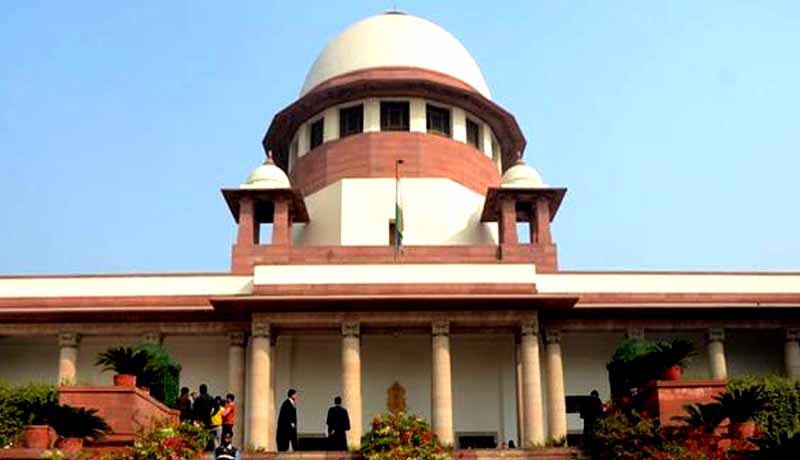No Retrospective effect to Amendment providing exemption to Special Additional duty from Basic Customs duty: SC [Read Judgment]

Ambiguity – Supreme Court – Tax – Taxscan
Ambiguity – Supreme Court – Tax – Taxscan
The two-judge bench of the Supreme Court of India, in a recent decision held that the Notification No. 124/2000 which was issued to amend the Notification No. 37/96 in order to exempt the Special Additional duty from the basic Customs duty has no retrospective effect.
In pursuance to a Treaty between the Government of India with Nepal, the Indian Government issued Notification No. 37 of 1996 dated 23.7.1996 in order to give exemption to specified goods from the Customs duty, when imported into India from Nepal. In the meanwhile, section 3A was incorporated in the Customs Tariff Act for imposition of special additional duty. Accordingly, Notification No. 18/2000-Customs was also issued on 1st March, 2000.
The case of the appellants is that, they were asked to pay Special Additional Duty (SAD), which was paid them under protest. Subsequently,Notification No. 124/2000-Customs was issued on 29.09.2000 amending the Notification No. 37/96-Customs dated 23rd July, 1996, which resulted in exemption of Special Additional Duty from the customs duty. Consequently, the appellant made an application for refund of Special Additional Duty (SAD) paid in respect of the imports made from Nepal during the period 01.03.2000 to 29.09.2000, which was rejected by the authorities.
Before the Tribunal, the appellant M/s Colgate Palmolive (India) Ltd submitted that Notification No. 124/2000 which amended the earlier Notification No. 37/96 and enlarged the scope of exemption from basic customs duty by including SAD, should be considered as retrospective in view of the language employed in the Treaty entered into between the two countries.
The Revenue, on the other hand, submitted that prior to 29.09.2000 SAD was correctly levied in respect of the imports and there is no justification in treating the notification in question as retrospective, more so, when the notification has clearly stated about scope of its applicability.
The Tribunal, while rejecting the contentions of the appellant, observed that the exemption notification could not be considered to be having retrospective effect and any exemption provision which enlarges the scope of earlier notification cannot be considered to be clarificatory. Further, it was pointed out that earlier notification did not even remotely suggest that exemption from basic customs duty also included the exemption from SAD and therefore, the appeal was dismissed.
The Apex Court, on further appeal preferred by the appellant found that, as per the provisions of the Treaty between India and Nepal, the Government of India would provide access to Indian market free from customs duties and quantitative restrictions of all articles manufactured in Nepal subject to conditions and restrictions.
The Court further observed that “It is pertinent to note here that the relief agreed related to duty chargeable under the head of “additional duty”. Clause 4 dealt with “additional duty applicable” on products manufactured by medium or large-scale units in Nepal in which case they were liable to pay additional duty equal tothe effective Indian excise duty rates applicable to similar Indian products. A reading of paragraphs 1, 3 and 4 would indicate that a distinction was made between the “basiccustoms duty” and “additional duty”leviable under the Customs Act and Excise Act on import. “Additional duty”had reference to excise duty payable on the said products when manufactured in India.”
The bench comprising of Justice Dipak Misra and Justice Prafulla C Pant further observed that “It is vivid that the protocol to the Treaty of Trade had made a distinction between the “basic customs duty” and “additional customs duty”. The basic customs duty was granted exemption. However, in respect of “additional duty”provisions of paragraph 3 or 4 were applicable. But, it is significant that the said protocol did not deal with special additional duty. Thus, per se and ex facie it is not possible to accept the position that “special additional duty” was itself exempted under the protocol. Paragraph 1 would not cover the “special additional duty”, which was specific and limited as was clear from the exemption notification dated 23rd July, 1996. It was restricted to the goods specified in column 2 of the First Schedule from the customs duty leviable under the First Schedule to the Tariff Act. In fact, special additional duty was not leviable and enforced when the Treaty of Trade was signed and the protocol was executed. Under these circumstances, it is not possible to accept the position that Clause 1 of the protocol had included and had embraced the “special additional duty”, which was introduced in the form of Section 3A enacted in 1998.”
While dismissing the appeal on the basis of the above findings, the apex Court also held that “The exemption which was granted by notification dated 29th September, 2000 was, therefore, in the nature of specific and new exemption from payment of specialadditional duty, which was otherwise payable in view of the introduction of Section 3A to the Tariff Act. It is difficult to appreciate that the exemption granted vide notification dated 20th September, 2000 to special additional duty was clarificatory or to give effect to the existing protocol. We think so as protocol appended to the Treaty could not have conceived of future levy by way of proposition. In any case, factually it does not. Therefore, the notification of 20thSeptember, 2000 conferred a new benefit which was not earlier stipulated or the subject matter of protocol”.
Read the full text of the Judgment below.


